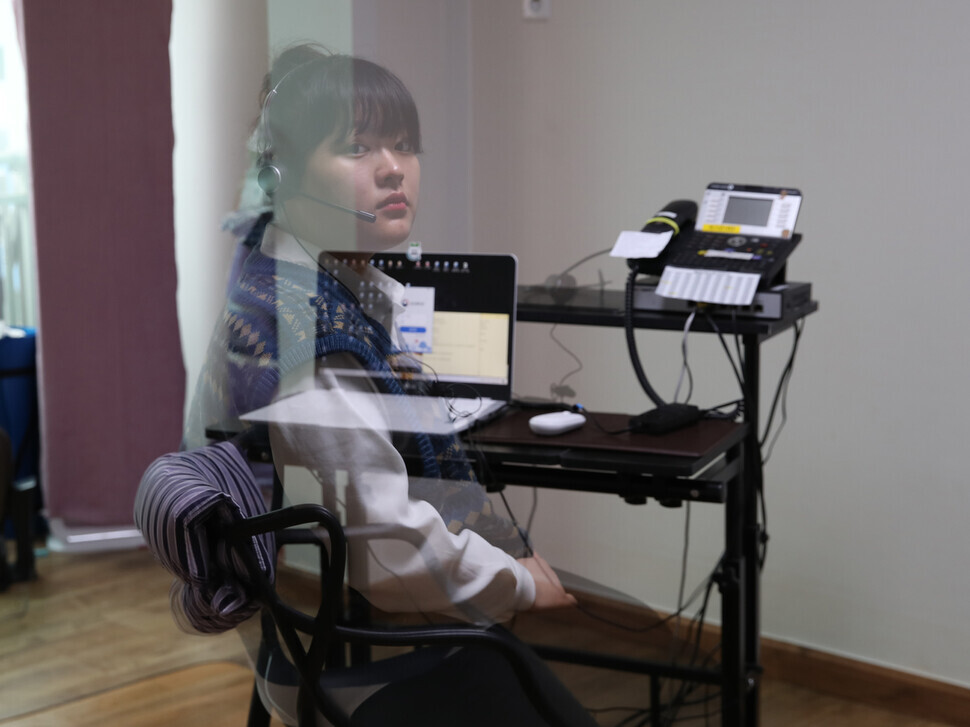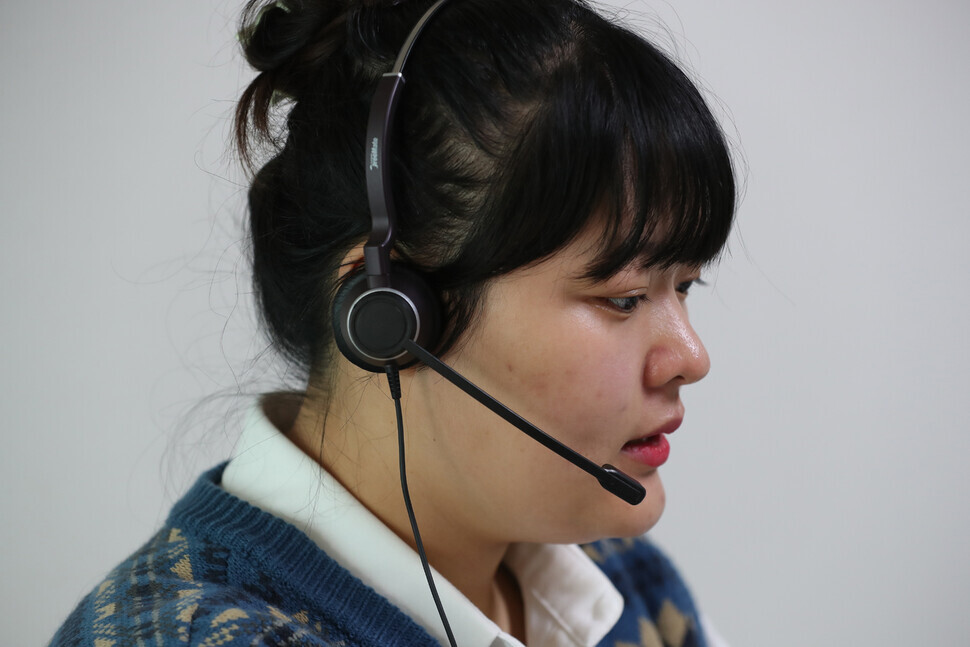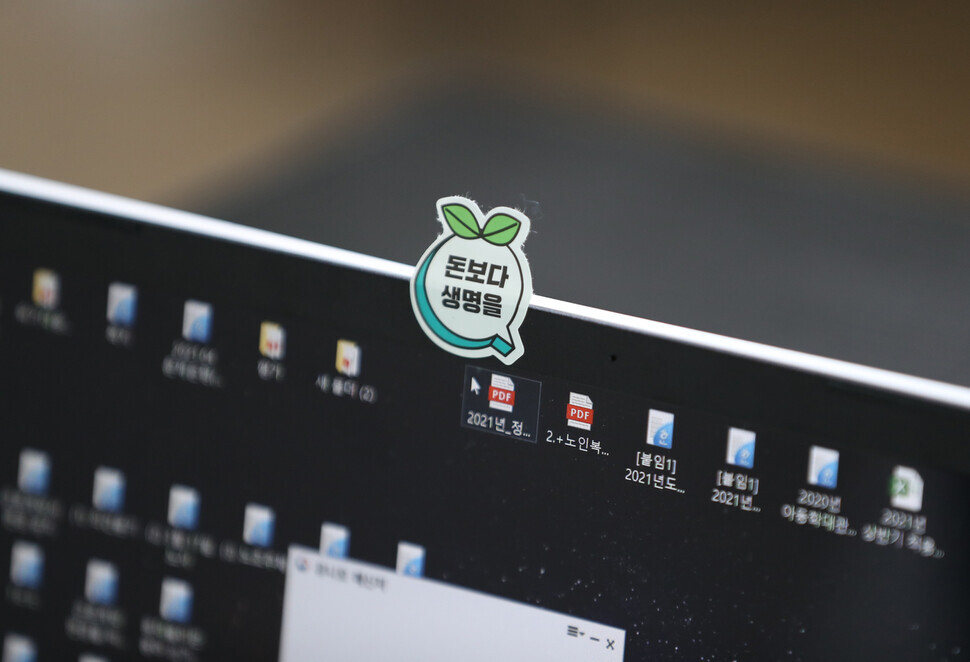hankyoreh
Links to other country sites 다른 나라 사이트 링크
Emotional labor behind suicide hotline

Kim Seul-gi, 28, receives telephone calls every day from people who say they want to die.
Different people, each with their own story, dial the suicide prevention number 1393 and are connected with Kim or one of her colleagues. She is a counselor employed with the crisis response counseling team at the Health & Welfare Call Center, affiliated with the South Korean Ministry of Health and Welfare (MOHW).
Although Kim performs official duties in her suicide prevention role — in a country with a suicide rate that ranks first among OECD members — she is not a government employee. Instead, she is a part of a class of employees employed on indefinite contracts by government agencies or public institutions.
The level of pay and benefits differs from official government employees, and members of this group are not subject to the seniority-based salary system.
“It doesn’t pay much, and there’s no raise in pay with experience, so there’s a high turnover rate,” she explained.

Call center employees earn the minimum wage. In March, Kim’s take-home pay amounted to 2.2 million won (US$1,982).
The COVID-19 pandemic has led to a large increase in calls, but the acute shortage of counselors means that many callers cannot receive proper counseling.
Last year, an average of 14,542 counseling calls were placed to 1393 per month — an increase of around 60 percent from pre-pandemic levels. Counselors take calls around the clock, with 36 workers operating under a four-team, three-shift system, but only about 5,000 calls reach a counselor. It’s a situation that has led to many complaints.
“I’ve had callers blame me for them harming themselves because there weren’t any counselors to take their call,” Kim said.
“It’s mortifying to get calls like that. It really makes me wonder what I’m doing,” she added. “We’re basically human shields.”
Kim’s job involves intense emotional labor, with numerous callers telling her every day about wanting to die. Yet, it is difficult for her to tend to her own mental health.

The call center provides two sessions of psychological counseling for employees with its crisis response counseling team — and even that came only after the mental health of its counselors was brought up as an issue in a parliamentary audit last year.
Even with the COVID-19 pandemic causing a surge in her counseling workload, Kim has not received holiday or overtime pay. The MOHW argued that the contract is a comprehensive arrangement that includes holiday and overtime pay in its basic rate.
Counselors filed a petition for unpaid wages with the Ministry of Employment and Labor in November 2019 — but it took 13 months for them before they received their back pay in January of this year.
By Park Jong-shik, staff photographer
Please direct comments or questions to [english@hani.co.kr]

Editorial・opinion
![[Editorial] Penalties for airing allegations against Korea’s first lady endanger free press [Editorial] Penalties for airing allegations against Korea’s first lady endanger free press](https://flexible.img.hani.co.kr/flexible/normal/500/300/imgdb/original/2024/0502/1817146398095106.jpg) [Editorial] Penalties for airing allegations against Korea’s first lady endanger free press
[Editorial] Penalties for airing allegations against Korea’s first lady endanger free press![[Editorial] Yoon must halt procurement of SM-3 interceptor missiles [Editorial] Yoon must halt procurement of SM-3 interceptor missiles](https://flexible.img.hani.co.kr/flexible/normal/500/300/imgdb/child/2024/0501/17145495551605_1717145495195344.jpg) [Editorial] Yoon must halt procurement of SM-3 interceptor missiles
[Editorial] Yoon must halt procurement of SM-3 interceptor missiles- [Guest essay] Maybe Korea’s rapid population decline is an opportunity, not a crisis
- [Column] Can Yoon steer diplomacy with Russia, China back on track?
- [Column] Season 2 of special prosecutor probe may be coming to Korea soon
- [Column] Park Geun-hye déjà vu in Yoon Suk-yeol
- [Editorial] New weight of N. Korea’s nuclear threats makes dialogue all the more urgent
- [Guest essay] The real reason Korea’s new right wants to dub Rhee a founding father
- [Column] ‘Choson’: Is it time we start referring to N. Korea in its own terms?
- [Editorial] Japan’s rewriting of history with Korea has gone too far
Most viewed articles
- 1[Editorial] Penalties for airing allegations against Korea’s first lady endanger free press
- 2Months and months of overdue wages are pushing migrant workers in Korea into debt
- 3In rejecting statute of limitations defense in massacre case, Korean court faces up to Vietnam War a
- 4Historic court ruling recognizes Korean state culpability for massacre in Vietnam
- 5“Those souls can rest now”: Vietnam massacre survivor reacts to Korean court win
- 6[Editorial] Verdict on Korea’s massacre in Vietnam a first step in atonement
- 7Ruling on Korean atrocity in Vietnam comes 23 years after Hankyoreh 21’s exposé
- 81 in 3 S. Korean security experts support nuclear armament, CSIS finds
- 9[Interview] Continuing the fight for victims of civilian massacres during Vietnam War
- 10Korea’s atrocities in Vietnam, in the words of those who saw and survived them